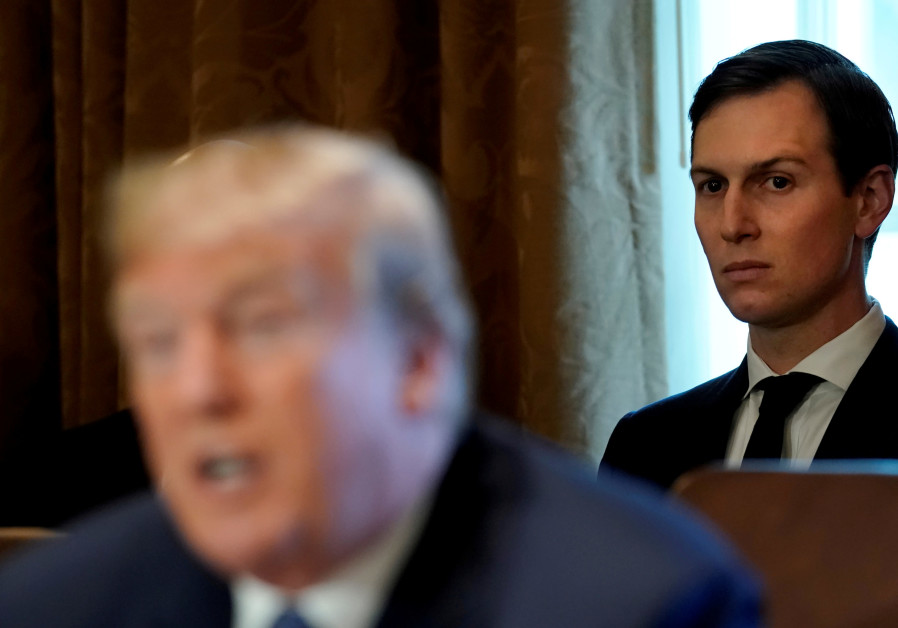How new elections could affect the peace plan – analysis

White House Senior adviser Jared Kushner sits behind U.S. President Donald Trump during a cabinet meeting at the White House in Washington, U.S., November 1, 2017. (photo credit: REUTERS/KEVIN LAMARQUE)
WASHINGTON – As the political clock in Israel ticks towards a new election, the “Deal of the Century” is yet again thrusted into uncertainty. The roll out, scheduled for months ago and already considerably delayed as to not interfere with Israel’s political process, may suffer postponement once more.
The peace team, headed by Trump’s son-in-law Jared Kushner and envoy Jason Greenblatt, made it clear that nothing will happen before Shavuot, on June 10. It is safe to assume that the administration had in mind that by June 10, Netanyahu will have formed a coalition. However, as the current political showdown between Netanyahu and his potential partner-slash-rival makes clear, Israel is now facing the prospects of a renewed election campaign, an unprecedented first in its short history.
This rapid turn of events must be rattling Kushner and his team, but not only them. The entire Israeli political system was, too, caught by surprise. For months now, political pundits have been repeating nightly that Netanyahu will form a new government by his late May deadline. It therefore came as no surprise when Kushner announced last week that the administration would release the economic portion of the peace plan in Bahrain on June 25.
Accordingly, no one raised any eyebrows when the Israeli media reported that current Minister of Finance Moshe Kahlon will represent Israel in the Bahrain summit.
But given the volatile nature of Israeli politics, we got another reminder that anything is possible. And thus, we find ourselves today in an awkward situation: the time and place for rolling out the economic plan has been carefully chosen and set, and yet it might still occur during an election in Israel, after all.
The location, of course, adds yet another layer of complexity to this saga. A Washington summit could be easily postponed if a new election campaign is called. A Bahrain summit, with other regional powers including Saudi Arabia and the UAE among its participants cannot easily be tempered with. This makes it even more likely that the roll out will take place in the original date, regardless of internal politics in Jerusalem. As of now, at any rate, the peace team is proceeding with the event as usual.
Another reason to believe that the workshop will take place, regardless of a possible election, has to do with its content: the workshop is officially described as a non-binding discussion of ways to improve the quality of life of the Palestinians. Given that the peace team’s political solution is not expected to be revealed in Bahrain, Kushner and Greenblatt might not feel under any pressure to postpone.
That said, in light of the recent reminder not to try and predict Israel’s political future, it is impossible to guess what the consequences of new elections would be, if such occur.
Meanwhile, the elephant – i.e. the political part of Kushner’s plan – remains in the center of the room. While no decision has been made as to its release date, new elections could make things even more complicated.
If, indeed, the Knesset schedules new elections in late August or early September, a new government would not be sworn in before early November, exactly as President Donald Trump enters the crucial year of his reelection campaign. It would be highly unusual for a sitting president to reveal a peace plan during an election year.
That would force the peace team to get back to the drawing board and to make a tough decision: release the plan during an election cycle in Israel, and risk its premature demise due to internal politics in Israel, or during an election cycle in America, risking its rapid abandonment due to political squabbling in the States. Another option - that cannot be ruled out at the moment – is that Kushner and Greenblatt might conclude that given the schedule, there is no other option but to postpone the political plan and its roll out indefinitely. The political developments in Israel in the upcoming 48 hours might help clarify where we are headed.
Join Jerusalem Post Premium Plus now for just $5 and upgrade your experience with an ads-free website and exclusive content. Click here>>






Comments are closed.